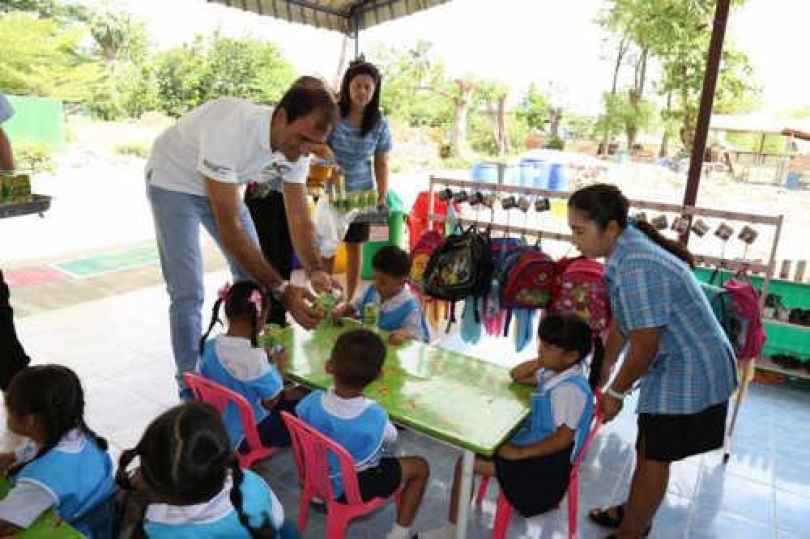THE ENVIRONMENT, education, society and safety are the keys to long-term business growth, Asia Cement co-managing director Napadol Ramyarupa said in an interview with The Nation.

In 2014, the company celebrated its 25th anniversary by initiating the installation of solar cells at schools in Bangkok and in Nakhon Sawan, Phetchaburi and Saraburi provinces.
It called this campaign the ’25 Renewable Energy Schools Project, which aims to establish 25 renewable-energy-powered schools by this year.
“We started this in 2014, and now have completed the project in 15 schools in Nakhon Sawan, Phetchaburi and Saraburi. The remaining 10 schools will be set up this year,” he said.
Under this campaign, the company is installing 4-kilowatt on-grid rooftop photovoltaic panels to be used in conjunction with electricity supplied by the Provincial Electricity Authority in small and medium-sized schools situated near the company’s cement plants.
When a school has a rooftop PV system, its electricity bills can be reduced by about 80-90 per cent, thus allowing it to increase its annual operating budget by 13-16 per cent.
Furthermore, participating schools serve as learning centres on renewable energy, knowledge that locals can apply to their daily lives, he said.
Besides installing the rooftop solar panels, the company has prepared educational handbooks on various scientific topics such as renewable energy, energy production and environmental protection, and energy conservation. These are distributed as teaching and study materials.
Napadol said that despite the fact that solar energy had been used for some time, the technology was still new in Thailand because of high installation costs.
Asia Cement has spent about Bt7 million on this project and has been able to reduce electricity costs by Bt720,000, which equates to 90,000 kilograms of carbon dioxide per year. Most important, the company has been able to educate and instil a sense of responsibility in future generations, which is invaluable, he said.
This project not only helps a school reduce its electricity bills, it provides education on the use of alternative energy and also teaches the children about technology. This is a project that supports the education of the community, he said.
At the same time, the company has tried to improve the quality of life of people in the communities near its cement plants in Nakhon Sawan, Phetchaburi and Saraburi provinces. Napadol said most of its CSR (corporate social responsibility) programmes arose from the suggestions of these communities.
For example, the company has provided paramedics for the communities around its cement plants. It also provides scholarships for students at nearby schools, and other activities to serve the communities’ needs, he said.
Asia Cement also has been running a Youth for Environmental Protection Camp since 2011. The camp’s objective is to instil in youth an understanding of environmental problems, leading to better solutions.
The project gives students exposure to these issues and the chance to return to their families and communities to share their knowledge regarding the importance of the environment, he said.
The company is also striving to make changes in the way it does its business, especially reducing carbon-dioxide emissions from the cement-production process.
It has also adopted a policy to reduce waste and electricity consumption at its plants. The company invested Bt1.3 billion to build a waste-heat-recovery and power-generation plant that opened in 2013.
The plant uses state-of-the-art technology that can generate electricity without the use of traditional fossil fuels. It can also thereby reduce heat, dust and other pollution and is completely environmentally friendly.
The plant generates electricity by using the residual heat generated from the clinker burning process. Instead of releasing this heat into the atmosphere, the hot gases are used to generate steam, which in turn is sent to a turbine that drives a generator to produce electricity. This helps reduce energy costs while also minimising the use of fossil fuels, a way to develop clean energy that can help reduce greenhouse-gas emissions, he said.
This state-of-the-art 21-megawatt power plant can produce 150 million kilowatt-hours per year without using fossil fuels, and reduce carbon-dioxide production by 120,000 tonnes per year, equivalent to the reforestation of 150,000 rai (24,000 hectares) of land.
Meanwhile, the company works to improve the efficiency of its production process to reduce waste. It is researching and developing innovative products, in support of its business goal to be environmentally friendly.
From its three current locations, Napadol said Asia Cement would expand to other locations in the future including Bangkok and Prachuap Khiri Khan. They will join its CSR education programme.
In the area of safety, the company aims to reduce accidents on the job this year to less than 6 per cent.
Napadol said Asia Cement’s CSR strategy resulted in communities trusting the company and recognising that its plants would not have any negative impacts on them.
“We can conduct business in such a way that our stakeholders including our staff, our shareholders, and the communities near our plants get quality of life. This is my goal,” he said.
This article was taken from here.
